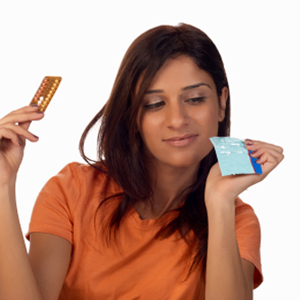
The Pill” is the nickname for the convenient combination contraceptive many women rely on and fewer than one in every 100 women who take it correctly for a year will fall pregnant. The progesterone “Mini Pill” is about 96% effective.
But the risk of an accident – 1% for the combination pill and 4% for the Mini Pill – can increase dramatically and even threaten your health if you don’t do things right. And some seemingly innocent medications can also make the Pill less effective.
Some women shouldn’t pop the PillWomen over 45 shouldn’t take contraceptive pills at all and neither should those over 35 who smoke, as the two factors combined increase the risk of heart disease.
In addition, some women can’t tolerate oestrogen (found in the combination pill) – including those with heart disease, deep vein thrombosis and a family history of breast, womb or liver cancer. Poorly managed diabetes, being overweight and gall bladder troublea re also reasons to avoid taking the Pill.
Watch out for these drugs
“Many kinds of medicine make the Pill less effective," says pharmacist Jaco Lotriet.Unexpected bleeding is one sign a drug is undermining the Pill.
Below is a list of common and specific drugs and remedies that can compromise your contraceptive protection and increase the risk of an accident.
1. Antibiotics
Antibiotics can render the Pill ineffective and it's therefore a good idea to take other precautions as well. They influence intestinal function, which is important for effective absorption of the Pill. Some can cause your body to metabolise the contraceptive too quickly, increasing the risk of pregnancy. Medications to look out for are TB drugs and drugs containing penicillin or tetracycline.
2. Herbal remedies and antacids
St John's Wort, herbs made from the berries of the chaste tree and antacids are among the medications than can make the Pill less effective. Some experts say antacids form a protective layer on the stomach lining, which undermines absorption of the Pill.
3. Acne medication and cancer treatment
If you're taking an acne remedy containing isotretinoin, such as Roaccutane, you should wait a year or two before trying to conceive, as this medication can cause birth defects. It also makes the Pill less effective.
People on cancer treatment should also seek medical advice about other kinds of contraception.
4. HIV/Aids medication
When the Pill is used in combination with HIV/Aids medication, both treatments can be influenced.
5. Epilepsy medication
Anti-epileptics, as well as drugs containing barbiturates, can increase the risk of pregnancy.
Preventing pregnancy is especially important if you're taking these drugs because there can be risks to the baby. Your doctor could prescribe a stronger pill or an alternative contraceptive method.




 Publications
Publications
 Partners
Partners













